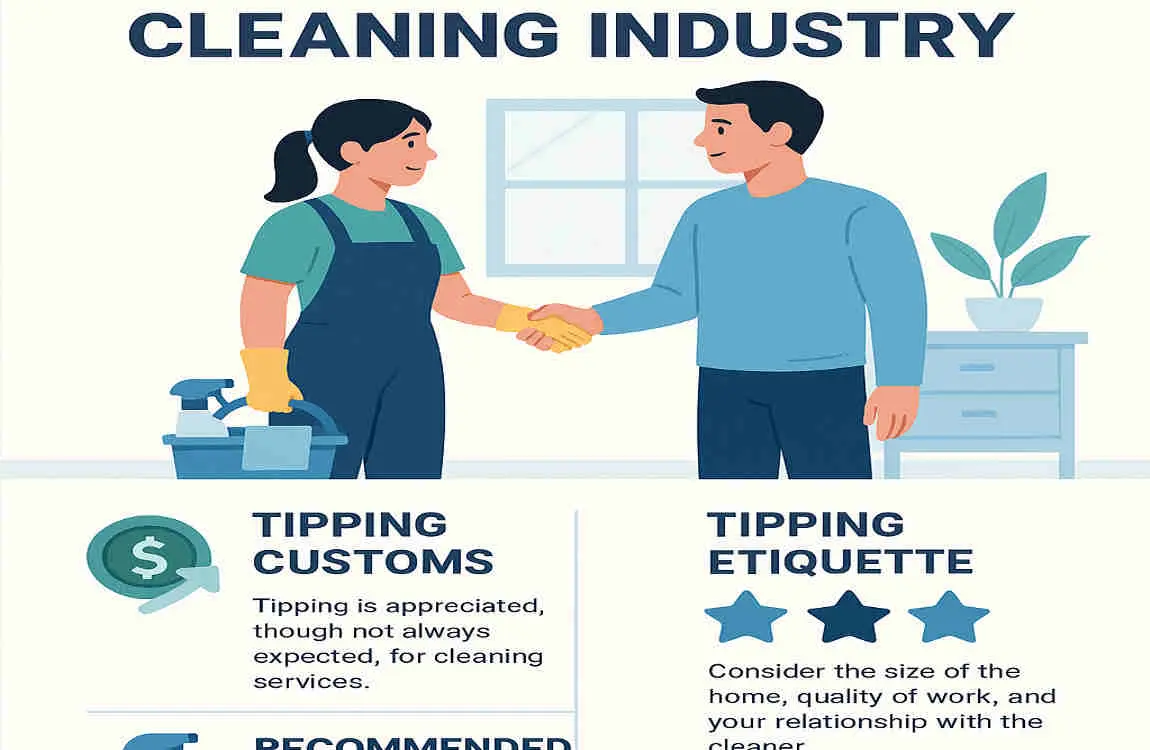Have you ever stood in your freshly cleaned living room, wondering if you should slip some extra cash to the person who just made your home sparkle? Tipping house cleaners can feel like a tricky puzzle, especially when you’re not sure about the rules. It’s one of those everyday decisions that mixes gratitude, money, and social norms, and it often leaves people scratching their heads.
In the world of home services, understanding tipping etiquette matters because it shows respect for hard work. House Cleaners put in real effort to tackle dust bunnies and grimy corners, and a tip can make a big difference in their day. But here’s the question on many minds: do you tip house cleaners? It’s not always a simple yes or no.
Understanding Tipping in the Cleaning Industry

Tipping might seem like a small gesture, but it’s a big deal in many service jobs. At its core, tipping means giving extra money beyond the agreed-upon fee to show appreciation for good service. In the house cleaning world, it’s like saying “thank you” with cash for going the extra mile.
This practice has deep roots in cultural habits, especially in places like the United States, where service workers often rely on tips to boost their income. Imagine a restaurant server—tips can make up a considerable part of their pay. The same idea applies to house cleaners, though it’s not as straightforward.
But tipping isn’t the same everywhere. In some countries, such as Japan or Australia, it’s not common and may even seem rude. In Europe, it varies by region—think a slight rounding up of the bill in France versus more generous tips in the UK. If you’re in the U.S., tipping is more expected, but even here, it depends on where you live. Urban areas might tip more than rural spots.
Now, let’s talk misconceptions. Many people assume house cleaners get paid well enough and don’t need tips. But that’s not always true—many earn modest wages, and tips help cover living costs. Another myth? That tipping is only for fancy services. Nope, even basic Cleaning can deserve a nod if it’s done with care.
Think about your own experiences. Have you ever tipped a delivery person but hesitated with a cleaner? It’s common, but understanding these basics can change how you approach it.
Factors to Consider Before Tipping Your House Cleaner
Deciding whether to tip starts with looking at a few key factors. These help you weigh the situation fairly. Let’s break them down one by one.
Quality of Service
First up: how well did they clean? Exceptional service stands out—like when your cleaner scrubs those hard-to-reach spots or organises your pantry without being asked. Standard service meets expectations but doesn’t wow you.
Assess this by walking through your home after they’re done. Did they miss any areas, or did everything shine? If it’s top-notch, a tip rewards that effort. Remember, cleaners deal with demanding jobs, so recognise when they exceed the basics.
Ask yourself: Would I hire them again based on this? If yes, that’s a sign to tip.
Frequency of Service
How often do they come? This matters a lot. For one-time cleanings, like after a party, people usually tip more generously—it’s a standalone job with no ongoing relationship.
Recurring services, say weekly or monthly, might involve smaller tips each time or a bigger one at holidays. Building habits here shows ongoing appreciation. If it’s regular, you might tip less per visit but consistently.
Consider your schedule. Frequent visits mean they’re part of your routine—treat them accordingly.
Relationship with the Cleaner
Who do you hire? If it’s a direct hire, like a freelancer you found through friends, tipping feels more personal. You’re dealing directly, so a tip goes straight to them.
Agency-employed cleaners are different. The company might have policies, and tips could be shared or discouraged. In these cases, check with the agency first.
Your bond counts too. A long-term cleaner who’s like family? Tipping strengthens that connection. Newcomer? Start small and build from there.
Local Customs and Norms
Don’t overlook where you live. Tipping norms vary widely. In big cities like New York, tipping 15-20% is common for services. In smaller towns, it might be less or even optional.
Research this by chatting with neighbours or browsing local forums. Apps like Nextdoor can reveal what’s typical in your area.
You play a role here—adapt to your community to avoid awkwardness. What do people around you do?
Common Guidelines for Tipping House Cleaners
Now that you’ve considered the factors, let’s get practical. What are the usual amounts? These aren’t complex rules, but they give a starting point.
For most cleanings, people tip 10-20% of the service cost. If a session costs $100, that’s $10-20. Flat amounts work too—$10-50, depending on the job size.
One-time cleanings often receive higher tips, such as $20-$ 50, because they require a greater effort without the benefit of repeat business. For regular house cleanings, $5-15 per visit adds up nicely.
Special occasions call for extras. Holidays? Bump it to $50-100 as a year-end thank you. Outstanding service, like deep-cleaning after a flood? Add 20-30% more.
Here’s a quick table to visua lise typical tipping guidelines:
Service Type: Typical Tip Amount: When to Use This
One-Time Cleaning $20-50 Post-party or move-in/out cleanings
Weekly Recurring $5-15 per visit Standard maintenance
Monthly Recurring $10-20 per visit , Less frequent but thorough
Holiday Bonus $50-100 End-of-year appreciation
Exceptional Service Extra 10-20% Above-and-beyond efforts
Use this as a guide, but adjust based on your budget and their work.
Alternatives to Tipping
Tipping isn’t the only way to show thanks. If cash feels off, try other options.
Bonuses or gifts can work wonders. A gift card to a coffee shop or cleaning supplies store says “I appreciate you” without money changing hands directly.
Small gestures count too—like providing snacks during the job or writing a thank-you note.
Building a strong relationship goes a long way. Communicate clearly about expectations, respect their time, and offer flexibility. This creates loyalty without tips.
What if you’re on a budget? A heartfelt review online can boost their business more than cash sometimes.
Ask yourself: How can I make their day better without spending extra?
How to Tip Your House Cleaner Appropriately

Ready to tip? Let’s cover the how-tos.
Give tips at the end of the service, in person. It feels personal. For holidays, a card with cash works great.
Cash is king—it’s immediate and tax-free for them. Digital tips via apps like Venmo are convenient, but they may involve fees. Pros of digital: easy tracking; cons: less personal.
Be discreet. Hand it over quietly with a smile, saying something like, “Thanks for the great job.” Timing matters—don’t rush it during the Cleaning.
Here’s a numbered list of steps for tipping smoothly:
- Decide the amount based on service quality.
- Prepare cash or a digital payment in advance. 3Процедуры3. Wait until the job is done.
- Hand it over with a genuine thank you.
- If it’s recurring, note it for consistency.
Follow these, and you’ll handle it like a pro.
Special Considerations
Not every situation fits the mould. Let’s explore some unique cases.
If your house cleaner works for an agency, tipping might not go directly to them. Some companies pool tips or ban them to ensure fair pay. Always ask the agency—many allow it, but confirm.
Tight budget? Show appreciation through non-monetary ways. Offer referrals, provide cold drinks, or say thanks verbally. It still motivates.
What if they refuse tips? Respect that—some prefer steady pay over extras. Don’t push; find another way to express gratitude.
Think about your own constraints. How can you adapt?
Impact of Tipping on House Cleaners
Tipping isn’t just polite—it affects real lives. Many cleaners earn hourly wages of around $15-25, and tips can add 10-30% to their income. This helps with bills, family needs, or even saving for the future.
From a cleaner’s view, tips boost motivation. Imagine scrubbing floors all day—a tip feels like recognition, encouraging better work next time.
I’ve heard stories from cleaners who say tips make tough days worthwhile. One shared how a holiday bonus helped buy school supplies for her kids. It builds morale and loyalty.
You have power here. Your tip could brighten someone’s week—consider that impact.

